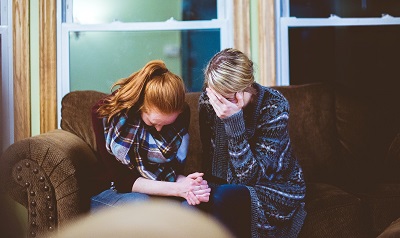 by Ward Shope
by Ward Shope
We, as a church in this last year, have been grieving the loss of those we love. The most public of those deaths have been people that we’ve known corporately. We’ve experienced them as leaders, teachers, examples and personal friends together. But apart from these, many individuals within the church have also lost parents and siblings and dear friends.
There are some who might philosophically try to convince us that death is just part of the cycle of life, but anyone whose loses a loved one realizes that death is never objective or philosophical. It’s personal and it hurts.
Even we who are believers, firmly set in the promises of life after death through Jesus, still know there are mysteries behind the veil. Besides the loss we now feel, we don’t understand how and if the relationship will be sustained? If they were believers, we know that they are eternally happy, and we know when we join them, we will also be eternally happy. Yet it is difficult to understand how this can be so when we miss them so much now. Do they miss us? Maybe we fear our relationship with them will change in the coming age, and we’re not sure we really want that. Have they put us behind them now?
There are those we didn’t love well before they died. We held grudges and kept our distance. Maybe when death came, we realized these things we held against them or they held against us were inconsequential compared to the transition taking place. We wasted time and energy on sustaining hurts that could not outlast death. By God’s grace, Jesus refuses to let our conflict cross over into the new age. But now, we ask him grace to be forgiven and to forgive on this side.
What about those we lost who were not believers? Could Jesus have spoken to them in their last moments on earth in ways we don’t understand?
We all grieve differently. Our relationships are different with each person. We knew them well or not so well. Our grief takes on different dimensions for those who profoundly impacted us. Maybe they introduced us to Jesus, or deepened our faith by the Spirit, or they ministered to us most when we needed it most. But we are also simply different. God has made us uniquely to reflect part of his image. What may seem to some like “stuffing their grief”, or “over reacting” to others, could be exactly what they need to experience God’s comfort.
All of these mysteries remain even as we remind ourselves of Gospel promises. All the more reason why we need each other now. In Scripture, we see the importance of the community. While Jesus knew he would raise Lazarus from the dead, he spent time listening to Mary and Martha’s grief, sensitively reminding them of gospel promises, and even weeping with them. For believers who had lost loved ones, Paul writes, “13 But we do not want you to be uninformed, brothers, about those who are asleep, that you may not grieve as others do who have no hope. 14 For since we believe that Jesus died and rose again, even so, through Jesus, God will bring with him those who have fallen asleep.” (1 Thessalonians 4:13-14).
And so we take comfort even in the mystery of death through Jesus Christ.
